After spending all of Thursday miserable on a bus, we were finally in Edinburgh. I absolutely loved the dorms we were staying in. I had a room to myself and it was so nice. I had a view of Arthur’s Seat, a bathroom attached to my room, and the shower was 10,000 x nicer than the shower in Cambridge.
Anyways, I woke up and went to breakfast. Sigh. Lots and lots of Scottish Breakfast. I have fortunately had enough experience with this that I did a pretty good job of judging which foods would be edible, which included toast, hashbrowns, and slices of cheese. There were many breakfast stations, all with the exact same foods. It was also chaotic. Breakfast was not my favorite.
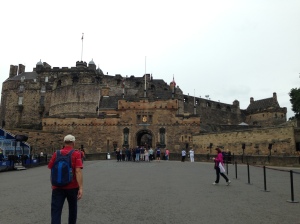 After eating breakfast, we all got back on the bus which took us to Edinburgh Castle. By which I mean, it dropped us off at the bottom of a cliff and the castle was on top of that cliff. It was quite the hike to get up that cliff (there were stairs but it was steep and long). We finally got to the castle and the day got better. There are statues of William Wallace and Robert the Bruce right outside the gate of the castle which excited me greatly. I paid the three pounds for the audio guide, but I honestly didn’t listen that often so it was a bit of a waste. We started off looking out over the city by the cannons, then went down to the National War Museum of Scotland which is inside the castle.
After eating breakfast, we all got back on the bus which took us to Edinburgh Castle. By which I mean, it dropped us off at the bottom of a cliff and the castle was on top of that cliff. It was quite the hike to get up that cliff (there were stairs but it was steep and long). We finally got to the castle and the day got better. There are statues of William Wallace and Robert the Bruce right outside the gate of the castle which excited me greatly. I paid the three pounds for the audio guide, but I honestly didn’t listen that often so it was a bit of a waste. We started off looking out over the city by the cannons, then went down to the National War Museum of Scotland which is inside the castle. 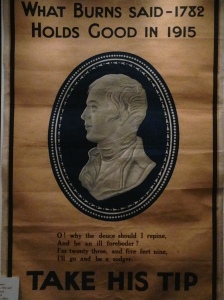 That was fun, and I found a bunch of propaganda posters I liked. In undergrad I did a project where I had to do research on a specific dead British guy based on his dead man’s penny. In WWI, Great Britain did not ship their dead home but rather buried them where they died and instead sent plaques to the next of kin instead. The museum had a bunch of these plaques, known as Dead Men’s Pennies which made me very happy/ sad to see that in only 100 years people have been willing to give up their dead relatives’ pennies. My dead guy, James Clough, was from the King’s Own Scottish Borderers and I was happy to see one of their recruiting posters there.
That was fun, and I found a bunch of propaganda posters I liked. In undergrad I did a project where I had to do research on a specific dead British guy based on his dead man’s penny. In WWI, Great Britain did not ship their dead home but rather buried them where they died and instead sent plaques to the next of kin instead. The museum had a bunch of these plaques, known as Dead Men’s Pennies which made me very happy/ sad to see that in only 100 years people have been willing to give up their dead relatives’ pennies. My dead guy, James Clough, was from the King’s Own Scottish Borderers and I was happy to see one of their recruiting posters there.
We continued through the Castle and saw various things including the William Wallace stained glass window, the Scottish Crown Jewels, the Royal Apartments, things like that. There was more to see, but a bunch of people in my group were hungry and tired so we left in search of lunch. Our original plan was to go to the Elephant House for lunch. 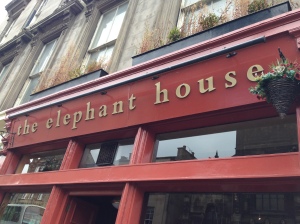 This is where JK Rowling would go while writing Harry Potter. Sadly, the line was really long and it was overly hot inside, so we went elsewhere. Just up the road from the elephant house was an Italian restaurant called Vittoria. The people who work at the front desk of the dorms we were staying in had suggested it the night before, so we went in there. What a disaster. It took over an hour for us to get food. Everyone but Emily and I had ordered starters so they at least got a little bit of food, but she and I had to sit there, starving, watching everyone else eat, for an hour. It felt like an eternity. While I was not one of those in the group who was hungry when we left the castle, by this point I was getting most hungry and grumpy. It must be a theme in Scotland, these meals that take absolutely forever to come.
This is where JK Rowling would go while writing Harry Potter. Sadly, the line was really long and it was overly hot inside, so we went elsewhere. Just up the road from the elephant house was an Italian restaurant called Vittoria. The people who work at the front desk of the dorms we were staying in had suggested it the night before, so we went in there. What a disaster. It took over an hour for us to get food. Everyone but Emily and I had ordered starters so they at least got a little bit of food, but she and I had to sit there, starving, watching everyone else eat, for an hour. It felt like an eternity. While I was not one of those in the group who was hungry when we left the castle, by this point I was getting most hungry and grumpy. It must be a theme in Scotland, these meals that take absolutely forever to come.
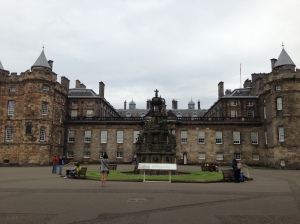 After our painfully long lunch, we headed out. There were 9 of us by this time, however, and we quickly realized we were too cumbersome as a large group. Emily and I broke off on our own and headed all the way down the Royal Mile to Holyrood Palace. Surprisingly, the others were more interested in shopping along the Royal Mile than in seeing the palace. It only cost 10.30 pounds to get in with a student discount which included an audio tour and the gardens. We weren’t allowed to take pictures inside, but I took one sneaky picture. The audio tour told this insane story of how Mary Queen of Scots’ husband got jealous of this dude Rizzio, so he burst in on them having dinner, pointed a gun at pregnant Mary Queen of Scots, and then he and a group of thugs grabbed Rizzio, took him to the next room, and stabbed him to death. So I got a sneaky picture of the spot where they killed Rizzio.
After our painfully long lunch, we headed out. There were 9 of us by this time, however, and we quickly realized we were too cumbersome as a large group. Emily and I broke off on our own and headed all the way down the Royal Mile to Holyrood Palace. Surprisingly, the others were more interested in shopping along the Royal Mile than in seeing the palace. It only cost 10.30 pounds to get in with a student discount which included an audio tour and the gardens. We weren’t allowed to take pictures inside, but I took one sneaky picture. The audio tour told this insane story of how Mary Queen of Scots’ husband got jealous of this dude Rizzio, so he burst in on them having dinner, pointed a gun at pregnant Mary Queen of Scots, and then he and a group of thugs grabbed Rizzio, took him to the next room, and stabbed him to death. So I got a sneaky picture of the spot where they killed Rizzio. 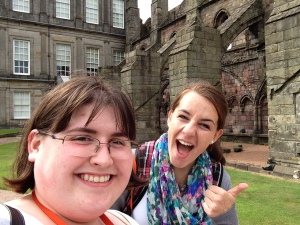 The tour let out into the ruin of Holyrood Abbey. I actually still don’t know how it was that the Abbey got destroyed, but it is a gorgeous ruin. The ruin lets out to the gardens which are at the base of Arthur’s Seat so you can see the mountain, the gardens, the palace, and the ruins all at once. It was pretty cool. After the tour, we had ice cream at the palace and felt awfully fancy 🙂
The tour let out into the ruin of Holyrood Abbey. I actually still don’t know how it was that the Abbey got destroyed, but it is a gorgeous ruin. The ruin lets out to the gardens which are at the base of Arthur’s Seat so you can see the mountain, the gardens, the palace, and the ruins all at once. It was pretty cool. After the tour, we had ice cream at the palace and felt awfully fancy 🙂
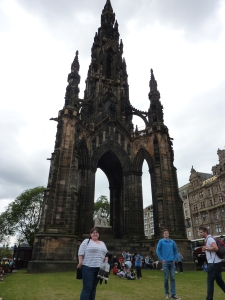 We then just leisurely went back up the Royal Mile stopping in various stores. We had a nice dinner (which was fortunately much faster) and then went to check out the Edinburgh Dungeon. We thought it looked a bit scary, so we walked over to the Sir Walter Scot monument instead. It was pretty tall and scary looking but was asked the guy and he said it wasn’t bad. He said it would be 10 minutes to the top and that there were various landings so it wasn’t bad. He was a liar. The first stop was about halfway up the monument. From then on, the stairs (which were already the awful twisty kind) narrowed considerably. In light of this, I remained on the first level while Emily went up to a few more levels. We were going to the Royal Edinburgh Military Tatoo that night, but it was still a little early. So, we made our way back to the Royal Mile. While we were waiting for the Tatoo, I purchased for myself a child’s toy bagpipe, but you can actually play it and I have been practicing with it.
We then just leisurely went back up the Royal Mile stopping in various stores. We had a nice dinner (which was fortunately much faster) and then went to check out the Edinburgh Dungeon. We thought it looked a bit scary, so we walked over to the Sir Walter Scot monument instead. It was pretty tall and scary looking but was asked the guy and he said it wasn’t bad. He said it would be 10 minutes to the top and that there were various landings so it wasn’t bad. He was a liar. The first stop was about halfway up the monument. From then on, the stairs (which were already the awful twisty kind) narrowed considerably. In light of this, I remained on the first level while Emily went up to a few more levels. We were going to the Royal Edinburgh Military Tatoo that night, but it was still a little early. So, we made our way back to the Royal Mile. While we were waiting for the Tatoo, I purchased for myself a child’s toy bagpipe, but you can actually play it and I have been practicing with it.
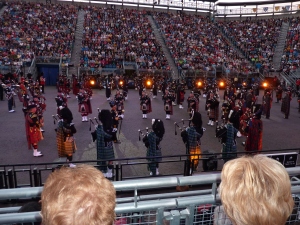 The Tattoo itself was absolutely amazing. The theme seemed to be Scots around the world so it was a mixture of cultures. There were some amazing bagpipers, but also other military bands from Malta, Trinidad and Tobago, Zulus, Maoris, and more. It was a mind boggling show. I can’t recommend it enough. The act from Malta was really the only disappointing act though they had their cool moments. Part of the problem was they were the first act on after a tremendous opening with the bagpipes so it seemed particularly bad. The show ended with fireworks over Edinburgh Castle and a dance party with all the acts together at once which was a lot of fun.
The Tattoo itself was absolutely amazing. The theme seemed to be Scots around the world so it was a mixture of cultures. There were some amazing bagpipers, but also other military bands from Malta, Trinidad and Tobago, Zulus, Maoris, and more. It was a mind boggling show. I can’t recommend it enough. The act from Malta was really the only disappointing act though they had their cool moments. Part of the problem was they were the first act on after a tremendous opening with the bagpipes so it seemed particularly bad. The show ended with fireworks over Edinburgh Castle and a dance party with all the acts together at once which was a lot of fun.
The next day was a bit odder. We went to the National Museum of Scotland in the morning which was nice, but we did not have enough time and we ended up splitting up. I wanted to see the exhibits on Scotland, WWI, and Vikings. Well, the Scotland stuff (as far as I could find) was mostly about weaving. There was a little about Bonnie Prince Charlie and Culloden, but I didn’t find anything on Robert the Bruce or William Wallace which is what I really wanted to see. I’m guessing I just missed that part because the museum had kind of a strange layout and it was easy to get lost. The WWI exhibit was only one room and we weren’t allowed to take pictures. It was about Scottish regiments around the world and how they maintained their Scottish identity. The best part for me at least) was they had Nancy the Springbok who was a mascot in a South African regiment. She was injured in a blast which made her horn grow back oddly. They had her stuffed and on display.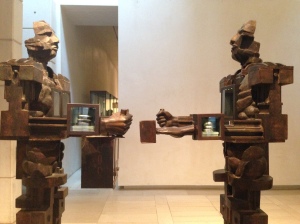 Then I went down to the Vikings/ Roman section, but I had so little time, I could barely take the time to figure out which bits were Viking vs. Roman. I would have liked a lot more time there. They had the weirdest displays in this section. Some artist made these weird statues with display boxes inset into them so you could see various pieces of jewelry on display on a human shaped form. To me, though, it looked like Rockem’ Sockem’ Robots viking style. it was pretty odd. I just had time to got to the gift shop and get a viking board game and then I had to leave.
Then I went down to the Vikings/ Roman section, but I had so little time, I could barely take the time to figure out which bits were Viking vs. Roman. I would have liked a lot more time there. They had the weirdest displays in this section. Some artist made these weird statues with display boxes inset into them so you could see various pieces of jewelry on display on a human shaped form. To me, though, it looked like Rockem’ Sockem’ Robots viking style. it was pretty odd. I just had time to got to the gift shop and get a viking board game and then I had to leave.
The reason I was in such a rush was that Kristina, Kari, and I had tickets to see Austentatious, an improv show based on Jane Austen. It was a part of the Fringe Festival and it was really funny. The problem was getting there. We got so lost and it was miserable getting there. Kristina had tried to go to a show in the same location the other day and had gotten lost. She got there 5 minutes late and was denied access, so it was particularly distressing. We found it eventually, but by the time we got there I was drenched in sweat and rain and was not having a fun time. We were able to get our tickets and lunch however, so that made up for it. We were still worrying about Kari, though, as she was coming separately and said she was stuck in traffic. She got there just as the show was about to start so everything was fine. The way Austentatious works is the audience writes down suggested Jane Austen novel titles and they are put in a basket. The actors then claim that one of them is a Jane Austen scholar and tells the audience how a bunch of lost Austen novels have been discovered, including…and then they read the titles of two of the suggestions, and then perform the third title pulled. We thus had the supreme pleasure of watching Breaking Cad: Meth Comes to Pemberley. It was glorious and supremely funny. Walter White was making “buns” and turning everyone in the village into bun fiends. His daughter helped him sell the buns, and his old friend, Mr. Wensleydale shows up and tries to dissuade him from this life. Walter White’s wife was increasingly pregnant throughout the show which was hilarious. She had some awkward looking bundle she was just holding under her dress and it would grow in size and lumpiness throughout. They kept saying, “Oh, you’ve been pregnant for 12 months now, are you sure it’s a baby?” and she had to do all sorts of physical labor, since she was pregnant. It was highly enjoyable and I highly recommend them. I found an audio recording of one of their shows on youtube. It is not as good without the visual, but it is still very good. I am sure the show would have been funnier for me had I seen Breaking Bad, but it was still hilarious even without having seen it.
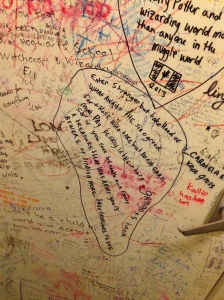 After that, however, my day became kind of odd. I basically ended up waiting with various groups to do something and not actually doing those things. After Austentatious Kari invited me to go with her and a group of her friends for sushi. I forgot how long eating takes in Scotland so I said ok, expecting it to be short, but it took forever. Then they wanted to go back to the rooms to build a fort and eat junk food, but I still wanted to see the city. So I started walking and immediately found a group of my friends waiting for another friend to get a coffee at the Elephant House. Once again the line was very long, however, so it took forever. I went in and got pictures of the bathroom, however, which was actually surprisingly moving. Fans of Harry Potter graffiti the bathroom with notes to JK Rowling and such. It is completely covered, including the toilet seat! I was really sad to find I had taken my pen out of my purse and was thus unable to leave a message of my own. Seeing the love poured out on the walls, however, was quite the experience. Then we moved on, but once again there were members of the group who were hungry and grumpy, so we stopped off for food again. Before this, I had run into other girls from our group who had mentioned the Mary King Close tour. I was interested, but they said the next tour wasn’t till 6:45, so I figured I had time. Well, I got there and what they had neglected to explain was that tours left every 15 minutes so you had to book a tour in advance. So by the time I got there the next tour wasn’t until after 8. That was too late for me. The weather was really gross and I was feeling defeated and it is a really long unpleasant walk back to the hotel, so my afternoon was kind of a drag. I think I was just exhausted because by the time I got to my room, absolutely everything was setting me off and I ended up bawling over an article about a giraffe (DO NOT LOOK IT UP IT IS TOO TRAGIC AND WILL MAKE YOU WEEP!)
After that, however, my day became kind of odd. I basically ended up waiting with various groups to do something and not actually doing those things. After Austentatious Kari invited me to go with her and a group of her friends for sushi. I forgot how long eating takes in Scotland so I said ok, expecting it to be short, but it took forever. Then they wanted to go back to the rooms to build a fort and eat junk food, but I still wanted to see the city. So I started walking and immediately found a group of my friends waiting for another friend to get a coffee at the Elephant House. Once again the line was very long, however, so it took forever. I went in and got pictures of the bathroom, however, which was actually surprisingly moving. Fans of Harry Potter graffiti the bathroom with notes to JK Rowling and such. It is completely covered, including the toilet seat! I was really sad to find I had taken my pen out of my purse and was thus unable to leave a message of my own. Seeing the love poured out on the walls, however, was quite the experience. Then we moved on, but once again there were members of the group who were hungry and grumpy, so we stopped off for food again. Before this, I had run into other girls from our group who had mentioned the Mary King Close tour. I was interested, but they said the next tour wasn’t till 6:45, so I figured I had time. Well, I got there and what they had neglected to explain was that tours left every 15 minutes so you had to book a tour in advance. So by the time I got there the next tour wasn’t until after 8. That was too late for me. The weather was really gross and I was feeling defeated and it is a really long unpleasant walk back to the hotel, so my afternoon was kind of a drag. I think I was just exhausted because by the time I got to my room, absolutely everything was setting me off and I ended up bawling over an article about a giraffe (DO NOT LOOK IT UP IT IS TOO TRAGIC AND WILL MAKE YOU WEEP!)
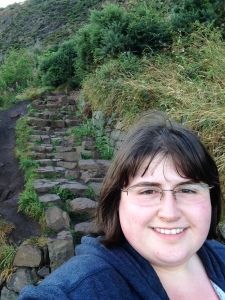 The next morning we were leaving and heading back to Cambridge. A bunch of people thus figured it was the day to wake up at the crack dawn, climb Arthur’s Seat and watch the sunrise. I wanted to climb the mountain, but waking up at 3:30 to climb a mountain in the dark was not my bag, baby, so instead I woke up at 6 to climb the mountain. It was absolutely gorgeous even without the sunrise. I think I was wearing the wrong shoes, however, as trying to balance on the uneven stone steps made my feet hurt like crazy. It was also steep and slippery, so I decided the safer idea was to turn around at approximately the halfway point. I went up a couple other paths till they too became treacherous, but I got lots of gorgeous pictures.
The next morning we were leaving and heading back to Cambridge. A bunch of people thus figured it was the day to wake up at the crack dawn, climb Arthur’s Seat and watch the sunrise. I wanted to climb the mountain, but waking up at 3:30 to climb a mountain in the dark was not my bag, baby, so instead I woke up at 6 to climb the mountain. It was absolutely gorgeous even without the sunrise. I think I was wearing the wrong shoes, however, as trying to balance on the uneven stone steps made my feet hurt like crazy. It was also steep and slippery, so I decided the safer idea was to turn around at approximately the halfway point. I went up a couple other paths till they too became treacherous, but I got lots of gorgeous pictures.
The bus stopped off at the border between Scotland and England for pictures and then again at a rest stop. It claimed to have a Burger King and I was trying to grab food so I could explore our next stop at York more. It said over the bridge and looked like you were supposed to go upstairs. Ok. Well, it turned out you went up the stairs, and then there was a bridge across the highway to the Burger King on the other side of the road! Anna and I speedwalked/ did Ministry of Silly Walks across as it was glass and the cars passing by could see you walking across the bridge.
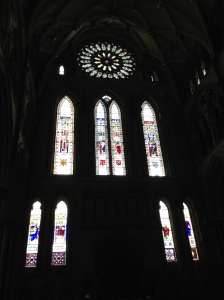 York was interesting. We parked and then found a map that was painted on a wall but if you wanted to have a paper copy to have, you had to pay 2 pounds. So I took a picture and used that. I saw York Minster (which was over priced and you could see most of if before paying but I had to use the bathroom so I payed the 9 pounds to use the bathroom and look around. Then I found a statue of Emperor Constantine the Great behind the Cathedral because he was apparently named Emperor around that spot!
York was interesting. We parked and then found a map that was painted on a wall but if you wanted to have a paper copy to have, you had to pay 2 pounds. So I took a picture and used that. I saw York Minster (which was over priced and you could see most of if before paying but I had to use the bathroom so I payed the 9 pounds to use the bathroom and look around. Then I found a statue of Emperor Constantine the Great behind the Cathedral because he was apparently named Emperor around that spot! 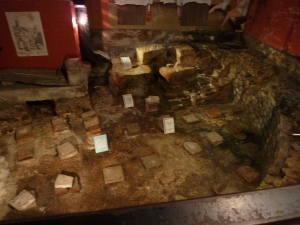 On the map there was a Roman Bath Museum marked. I used my picture of a map to get there, but the battery was dying so I rarely dared to look at the map. When I got there, it turned out to mostly be a pub called The Roman Baths, but the ruins of the Roman baths were in the basement. The one guy working there was very nice and actually talked to me a long time about medieval art, but I was a bit worried about time because we only had about an hour and 40 minutes total in York. It turns out I needn’t have worried because the museum was very small. It was basically one room and was very obviously a low budget affair. I had already watched the Nova documentary on building a Roman bath twice in recent memory for Professory McMahon’s classes so I already knew a lot of the things that were there. The pillai, the tubuli, the furnaces, Caldarium, Tepidarium, and Frigidarium, etc. were all there.
On the map there was a Roman Bath Museum marked. I used my picture of a map to get there, but the battery was dying so I rarely dared to look at the map. When I got there, it turned out to mostly be a pub called The Roman Baths, but the ruins of the Roman baths were in the basement. The one guy working there was very nice and actually talked to me a long time about medieval art, but I was a bit worried about time because we only had about an hour and 40 minutes total in York. It turns out I needn’t have worried because the museum was very small. It was basically one room and was very obviously a low budget affair. I had already watched the Nova documentary on building a Roman bath twice in recent memory for Professory McMahon’s classes so I already knew a lot of the things that were there. The pillai, the tubuli, the furnaces, Caldarium, Tepidarium, and Frigidarium, etc. were all there.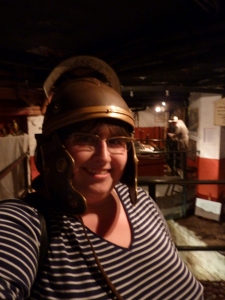 For me, cheesy as it is,my favorite part was putting on Roman helmets. They were actual nice helmets so you got a real sense of wearing one would be like. They were heavy, face squishing, and in some cases claustrophobic. My favorite was the cheek flap variety in terms of comfort. Then I left, ran into the other girls, got some ice cream, and got back on the bus. We got back to Cambridge around dinner time, at pizza at The Cow, and went to bed. And that’s all I’ve got to say about that 🙂
For me, cheesy as it is,my favorite part was putting on Roman helmets. They were actual nice helmets so you got a real sense of wearing one would be like. They were heavy, face squishing, and in some cases claustrophobic. My favorite was the cheek flap variety in terms of comfort. Then I left, ran into the other girls, got some ice cream, and got back on the bus. We got back to Cambridge around dinner time, at pizza at The Cow, and went to bed. And that’s all I’ve got to say about that 🙂

Hi there, My grandfather was James Clough of the KOSB – he was killed in June 1916. I believe however that there were 2 soldiers fron the KOSB by the name of James Clough, who were both killed during WW1.One was a Cpl , the other, my grandfather was a private. I dont believe it will be my grandfather, as I still have his memorial plaque (dead mans penny). All the same it would be nice to hear from you if the project was about my relative. Regards, Kevin.
Hi Kevin,
I am very excited to hear from you as I had never thought I might find a possible relative of the James Clough that I researched. The way the assignment worked was that my professor walked into our lecture hall one day with a suitcase. He emptied the suitcase which was filled with memorial plaques out on a table and had all the students come and select one at random. We then had to find as much as we possibly could about the soldier whose name was on our plaques. We were allowed to look at the plaques for a few minutes, and then we had to find our soldier’s regimental number on a list he had already created. The regimental identification number of the James Clough that I researched was 8422 and he was a private. The fact that he was a private makes me think that maybe I did research your grandfather. The death date that I have for James Clough is June 16, 1915. This is close enough to the date that you gave me, June 1916, that I can easily see the numbers getting transposed somewhere. I was trying to think of how I could have researched your grandfather while you still had the plaque, so it may be due to there being multiple James Cloughs. If my professor found a James Clough that died in WWI, he may have then written down that regimental number and stopped looking for other James Cloughs. I also know that he was selling that particular memorial plaque on ebay about a year ago.
The paper I wrote on James Clough has unfortunately been lost between several computer crashes since I wrote the paper in 2010. I did however keep my records that I printed out while researching, so I can still tell you about the James Clough that I researched. I had some difficulties while researching so there is a margin of error. I have been told that around 50% of the old WWI records were destroyed in the Blitz and it looks like James Clough’s records were among those destroyed. Also, crazily enough, the British National Archives went on strike just as we were getting the assignment, so I had very limited access to records through the archives. I was mostly successful at finding information through the Commonwealth War Graves Commission and through census records. This only gave me a tiny glimpse of James Clough approximately every 10 years when census records were taken so I had to do a lot of reading between the lines. That being said, here is what I learned about the Private James Clough whose regimental id # is 8422.
James Clough was married to Eliza Clough and according to their 1901 census records (I could not find their 1911 census records) they had three children, Janey, Constance, and James. in 1901 James Clough (8422) was 26 years old and employed as a coal carter. They lived in Ashton-under-Lyne, Lancashire. At that point they were living at 15 Mount Pleasant Street and they had a boarder living with them named Jonathon Shufflebottom. There were a bunch of Cloughs living in Ashton-under-Lyne – he and his son were not the only James Cloughs living there. The way I was able to track this James Clough rather than the other James Cloughs was that his death records state that he was married to Eliza, so I had to look for Eliza’s name in conjunction with James Clough to make sure I had the correct James Clough. His son James also fought in WWI and his records survived, though he joined at the very end of the war (he was born 5/5/1900 so he only turned 18 in the very last year of the war). According to his records he wanted to be in the dragoons (there is a line on his forms asking where you would like to be placed) and it looks like he ended up in the King’s Own Royal Lancaster Regiment. This James Clough listed Eliza as his mother and was still at the same address that was listed for his father when he died, 23 Junction Street, Ashton-under-Lyne.
James Clough (8422) would have been around 39 years old when WWI began so he was on the somewhat older end of the spectrum of soldiers. Since I could not find his 1911 census I am not exactly sure what he was up to between 1901 and the start of the war, but he seems to have gone from a coal carter to one of the first groups to be deployed. He was in the KOSB 2nd Battalion and they landed at Havre on 15/8/14. His identification number is also a pretty low number, so he may have already been in the army when the war broke out, or joined very early. He was in the Aldershot theater of war and died in Ypres. His records merely say “died of wounds” so what actually happened to him is not clear. He died not terribly long after the Second Battle of Ypres and is buried in a graveyard there, so my theory was that he may have been injured during that battle and died later. He is buried at Dickebusch New Military Cemetery in Ypres, section E.3. There are also a lot of Australians buried in his cemetery which made me think it was still an active cemetery during the 3rd Battle of Ypres, Passchendaele, where many Australians died. That would make him one of the later people buried there from the Second Battle of Ypres.
I also have some earlier census information that I think was the James Clough I was researching (the ages match), but without Eliza’s name connected, I can’t be sure. If I did find the correct younger James, his mother was Hannah Clough. The two of them were boarders living with an Ellen Driver in Ashton-under-Lyne when James was 6 according to the 1881 census. In their 1891 census they were still boarders, but they were living in Wigan. The handwriting is a bit difficult to make out on this document, but James appears to have been employed as a cotton laborer and Hannah is listed as a cotton spinner.
I hope this was helpful to you, and it certainly would be very cool if I had indeed researched your ancestor. I actually have a kind of silly question for you. I have only seen Clough written on paper and have been wondering how it is pronounced, as I can think of several sounds “ough” makes. I thought when I picked his memorial plaque that he had such a unique name it would be easy to find him, never realizing how many James Cloughs there were, even just in Ashton-under-Lyne. Thank you for your interest, and I hope you have a great day!
Sincerely,
Jessica
Hi Jessica,
Sorry I haven’t got back to you before – truth is I have only just found your response.
From your reply, I am 100% certain that you did in fact research my grandfather. Eliza was my grandmother and their children in descending age order were James, Janey (Jennie), Constance (Connie), Robert and Eric. Eric was my father. He was only just over two years old when his father (my grandfather) was killed and so never really new him. They are all now sadly deceased.
I am so sorry that I didnt know of your research at the time you undertook it. I could have assisted you and perhaps filled in gaps, even given you a copy of a family group photograph to use. I have a copy of a family group photograph of all seven relatives named above. It was taken in 1914 !
The matter of the plaque is a mystery – though I remain certain of the authenticity of mine as I know for certain it was handed down through the generations without leaving the family. There are as you say many of them about and can be bought on Ebay for around $25. I would never sell mine though.
My grandfathers service number was 8422 and you are right that he rejoined the army as he was too old for conscription in 1914/15. His enlistment has ever since been a matter of great debate within the family (certainly between my father and aunts and uncles).
He was in fact wounded at the second battle of Ypres (Leper as it is now known) and died of his wounds in a field hospital. I believe this to have been some weeks later, hence the gap between the second battle ending and his death. I dont have much information on this as it was never really discussed, (probably because it became common knowledge that there was some terrible suffering amongst the wounded at that time – even more so that modern days, due to medical inadequacies and conditions generally).
Our name – Clough – was a very common one in and around the Manchester area of Lancashire at that time. It dates back to medieval times and refers to families living in small valleys or near to a small stream. Such areas locally in England were often referred to as ‘Cloughs’. There is a small recreation area near to where I live which is still known as ‘Boggart – old – Clough’. It is simply as I said a small stream running through a valley where people used to walk, picnic and generally socialise in previous generations. Sadly not used as much now apart from mainly dog walking.
I notice your comments about the pronunciation of our name. This is on of the many anomalies of the great English language which we Brits use. Best way I can help is to perhaps say that phonetically it is pronounced as KLUFF.
I have just been to London to look at the poppies which have been placed around the moat of the the Tower of London. 888,246 of them – one for each English soldier killed in WW1. It is an awesome sight. Search Tower of London poppies on Google if you want to look at some photographs which people have posted.
It really was great to hear from you, and I feel quite proud in a strange sort of way that my grandfather was researched in such a way.
If you want to communicate further please use my email address as I will pick it up much sooner. I received no notification of you reply and only came back to it by chance. (kevin.clough1@ntlworld.com)
Good luck and all the best for the future,
Regards, Kevin.